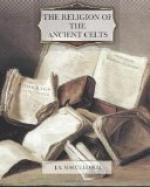The Celtic belief in Tir fa Tonn is closely connected with the current belief in submerged towns or lands, found in greatest detail on the Breton coast. Here there are many such legends, but most prominent are those which tell how the town of Is was submerged because of the wickedness of its people, or of Dahut, its king’s daughter, who sometimes still seeks the love of mortals. It is occasionally seen below the waves or even on their surface.[1257] Elsewhere in Celtic regions similar legends are found, and the submersion is the result of a curse, of the breaking of a tabu, or of neglect to cover a sacred well.[1258] Probably the tradition of actual cataclysms or inroads of the sea, such as the Celts encountered on the coasts of Holland, may account for some of these legends, which then mingled with myths of the divine water-world.
The idea that Elysium is co-extensive with this world and hidden in a mist is perhaps connected with the belief in the magical powers of the gods. As the Druids could raise a mist at will, so too might the gods, who then created a temporary Elysium in it. From such a mist, usually on a hill, supernatural beings often emerged to meet mortals, and in Maerchen fairyland is sometimes found within a mist.[1259] It was already believed that part of the gods’ land was not far off; it was invisibly on or within the hills on whose slopes men saw the mist swirling mysteriously. Hence the mist may simply have concealed the sid of the gods. But there may also have been a belief that this world was actually interpenetrated by the divine world, for this is believed of fairyland in Welsh and Irish folk-lore. Men may unwittingly interfere with it, or have it suddenly revealed to them, or be carried into it and made invisible.[1260]
In most of the tales Elysium is a land without grief or death, where there is immortal youth and peace, and every kind of delight. But in some, while the sensuous delights are still the same, the inhabitants are at war, invite the aid of mortals to overcome their foes, and are even slain in fight. Still in both groups Elysium is a land of gods and supernatural folk whither mortals are invited by favour. It is never the world of the dead; its people are not mortals who have died and gone thither. The two conceptions of Elysium as a land of peace and deathlessness, and as a land where war and death may occur, may both be primitive. The latter may have been formed by reflecting back on the divine world the actions of the world of mortals, and it would also be on a parallel with the conception of the world of the dead where warriors perhaps still fought, since they were buried with their weapons. There were also myths of gods warring with each other. But men may also have felt that the gods were not as themselves, that their land must be one of peace and deathlessness. Hence the idea of the peaceful Elysium, which perhaps found most favour with the people. Mr. Nutt thought




